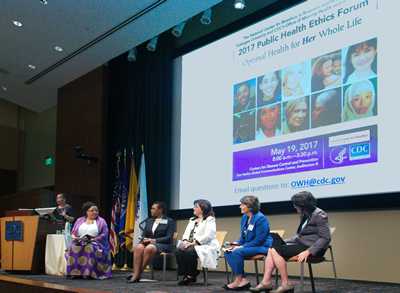2017 Public Health Ethics Forum
The 2017 Public Health Ethics Forum, “Optimal Health for Her Whole Life,” focused on a range of health issues and actions to improve the health of women and girls in the United States. The National Center for Bioethics in Research and Health Care at Tuskegee University and the Office of Minority Health and Health Equity at the Centers for Disease Control and Prevention (CDC) host this annual event. This year’s forum explored ways to promote and protect women’s health across the lifespan by emphasizing public health ethics in the practice of public health.
In order to ensure that public health practice is ethical, it should be guided by ethical theory and an ethical analysis process. “Public health ethics deals primarily with the moral foundations and justifications for public health, the various ethical challenges raised by limited resources for promoting health, and real or perceived tensions between collective benefits and individual liberty (Stanford Encyclopedia of Philosophy). CDC defines public health ethics as “a systematic process to clarify, prioritize, and justify possible courses of public health action based on ethical principles, values and beliefs of stakeholders, and scientific and other information.”
A public health ethics lens ensures a uniquely expanded focus on population health opportunities and challenges. The 2017 forum participants discussed the interests and health of women and girls, the extent to which resources that support their health are distributed equitably, and how best to perform work that includes both individual rights and group interests in public health interventions. For example, how can we balance the values and beliefs of stakeholders (e.g., women, families, healthcare providers, policymakers, employers) with good public health practice?
Forum participants tackled a variety of health issues, including chronic diseases (e.g., heart disease and stroke, diabetes, breast and cervical cancer, and obesity), health issues like preventing the spread of HIV and other sexually transmitted infections, reducing violence against women and girls, and improving social and economic factors that affect women’s health (e.g., education and income).
Objectives of the 2017 Public Health Ethics Forum
- Identify public health challenges and opportunities to improve the health of women and girls,
- Describe protective factors that can be integrated into public health practice, research, and policies,
- Articulate women’s health issues within a public health ethics framework,
- Build multi-sectoral collaborations to enhance women’s health, and
- Develop trans-disciplinary working groups to advance women’s health.

2017 Public Health Ethics Forum Resources
- Page last reviewed: September 19, 2017
- Page last updated: September 19, 2017
- Content source:


 ShareCompartir
ShareCompartir